TV reports say embassies, communities heighten security as Iran promises to avenge assassination of nuclear physicist Mohsen Fakhrizadeh, allegedly by Israel
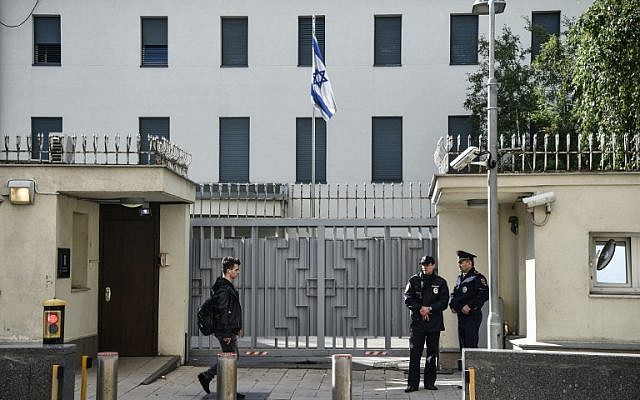
Israel has raised alertness in its embassies around the world in the wake of the assassination of Iran’s top nuclear scientist, Tehran’s finger-pointing at Israel and the Islamic Republic’s vow to avenge his death, according to television reports Saturday.
Jewish communities across the globe are also taking precautions, according to Channel 12 news.
The Foreign Ministry has refused to comment on security arrangements.
Multiple top Iranian officials have blamed Israel for the death of Mohsen Fakhrizadeh, the alleged mastermind of Iran’s rogue nuclear weapons program, and vowed to avenge his death. The New York Times also reported that Israel was behind the attack, citing three unnamed intelligence officials.
Fakhrizadeh died in a bombing and shooting attack outside Tehran Friday.
Iran and Hezbollah have been accused of targeting Israelis and Jews around the world on multiple occasions, and Israeli and Jewish sites are seen as prime targets for reprisals following alleged Israeli attacks.
Tehran also has forces at its disposal all around Israel, including troops and proxies in neighboring Syria, Hezbollah in Lebanon and Islamic Jihad — and to a lesser extent Hamas — in the Gaza Strip.
There has been no word so far of the Israeli military raising its alertness level along the country’s borders.
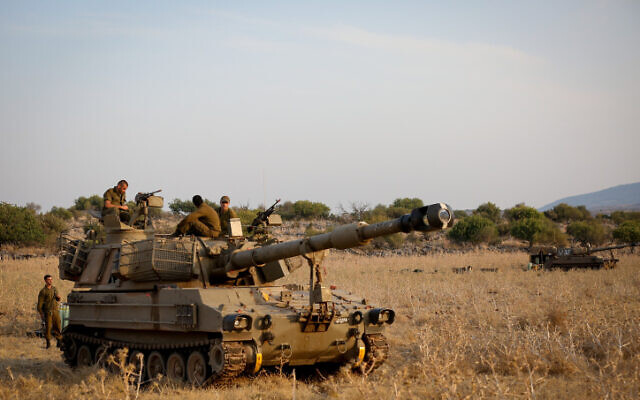
Israel has long been suspected of carrying out a series of targeted killings of Iranian nuclear scientists nearly a decade ago, in a bid to curtail Iran’s nuclear program. It made no comment on the matter Friday.
After years of being in the shadows, the image of Fakhrizadeh suddenly was to be seen everywhere in Iranian media, as his widow spoke on state television and officials publicly demanded revenge on Israel for the scientist’s slaying.
Iranian President Hassan Rouhani accused Israel of being behind the killing of the top nuclear scientist.
“Once again, the evil hands of global arrogance were stained with the blood of the mercenary usurper Zionist regime,” Rouhani said in a statement. Iran generally uses the term “global arrogance” to refer to the United States.
“The assassination of martyr Fakhrizadeh shows our enemies’ despair and the depth of their hatred… His martyrdom will not slow down our achievements,” he added.
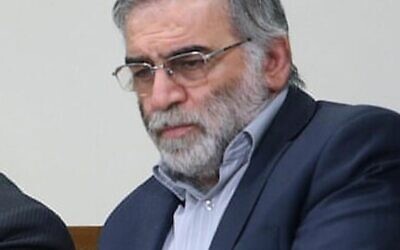
Iran’s supreme leader Ayatollah Ali Khamenei urged “punishing” those behind the assassination, adding that his work must be carried on.
Iran’s civilian atomic program has continued its experiments and now enriches a growing uranium stockpile up to 4.5 percent purity in response to the collapse of Iran’s nuclear deal after the US’s 2018 withdrawal from the accord. That’s still far below weapons-grade levels of 90%, though experts warn Iran now has enough low-enriched uranium for at least two atomic bombs if it chose to pursue them.
Khamenei called for “following up on this crime and certainly punishing the perpetrators and those responsible, and… continuing the scientific and technical efforts of this martyr in all of the fields he was working in,” according to a statement on the supreme leader’s official website.
Khamenei called Mohsen Fakhrizadeh a “prestigious nuclear and defense scientist” and said he was “martyred by the hands of criminal and cruel mercenaries.”
Iranian Foreign Minister Mohammad Javad Zarif claimed there were “serious indications of [an] Israeli role” in the assassination.
“Terrorists murdered an eminent Iranian scientist today. This cowardice — with serious indications of Israeli role — shows desperate warmongering of perpetrators,” Zarif wrote on Twitter. He called on the international community to “end their shameful double standards and condemn this act of state terror.”
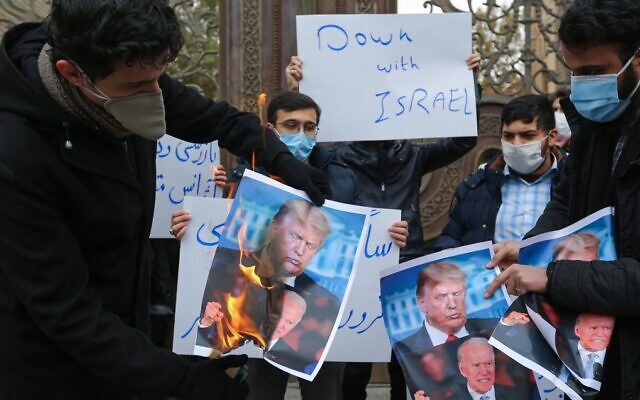
Hossein Dehghan, an adviser to Khamenei and a presidential candidate in Iran’s 2021 election, issued a warning on Twitter.
“In the last days of their gambling ally’s political life, the Zionists seek to intensify and increase pressure on Iran to wage a full-blown war,” Dehghan wrote, appearing to refer to US President Donald Trump. “We will descend like lightning on the killers of this oppressed martyr and we will make them regret their actions!”
On Saturday the head of the Hamas terror group Ismail Haniyeh phoned Zarif to condemn the killing, saying it “reflects a criminal mentality that allows murder in broad daylight. The policy of assassinations, just as it didn’t succeed with the resistance in Palestine, will fail with Iran and the entire… resistance axis.”
Friday and Saturday also saw protests against Israel and the US in Iran in the wake of the killing, with demonstrators burning Israeli and American flags, as well as photos of US President Donald Trump and President-elect Joe Biden.
Fakhrizadeh’s widow appeared unnamed on state television in a black chador, saying his death would spark a thousand others to take up his work.
“He wanted to get martyred and his wish came true,” she said.
On Saturday night, the family of Fakhrizadeh gathered at a mosque in central Tehran for his funeral service, a website associated with Iranian state TV reported. The scientist’s body lay in a flag-draped, open coffin, his eyes closed. Ebrahim Raisi, Iran’s chief justice and a leading Shiite cleric, offered prayers over his body.
The attack has also renewed fears of Iran striking back against the US, Israel’s closest ally in the region, as it did earlier this year when a US drone strike killed top Iranian general Qassem Soleimani. The US military acknowledged moving an aircraft carrier back into the region, while an Iranian lawmaker suggested throwing out UN nuclear inspectors in response to the killing.
Fakhrizadeh was killed on Friday in an ambush in Absard, a village just east of the capital Tehran, as his vehicle neared a truck that exploded when he approached. Local reports then described a barrage of automatic gunfire as gunmen emerged from a nearby car. A firefight erupted between the assassins and Fakhrizadeh’s bodyguards. The attackers wounded Fakhrizadeh and killed at least three of the guards before escaping.
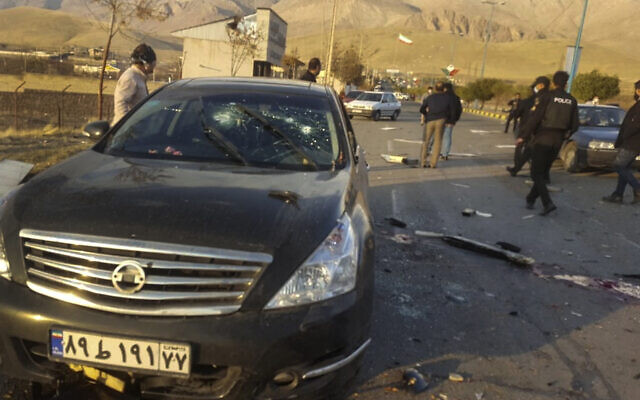
Photos and video shared online showed a Nissan sedan with bullet holes in the windshield, blood pooled on the asphalt and debris scattered along a stretch of the road.
The area around Absard, which has a view of Mount Damavand, the country’s highest peak, is filled with vacation villas. Roads on Friday, part of the Iranian weekend, were emptier than normal due to a lockdown over the coronavirus pandemic, offering his attackers a chance to strike with fewer people around.
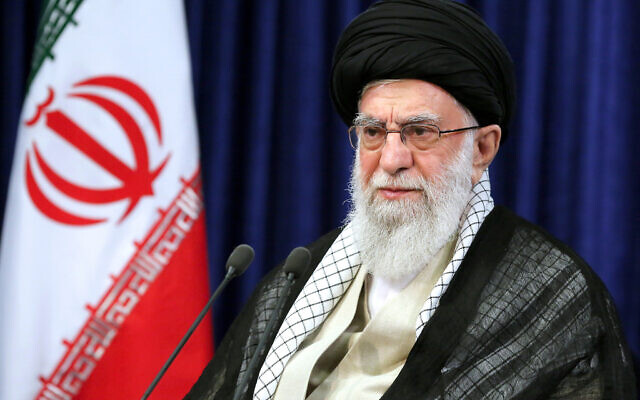
The attack comes just days before the 10-year anniversary of the killing of Iranian nuclear scientist Majid Shahriari that Tehran also blamed on Israel. That and other targeted killings happened at the time that the so-called Stuxnet virus, believed to be an Israeli and American creation, destroyed Iranian centrifuges.
Fakhrizadeh led Iran’s so-called AMAD program that Israel and the West have alleged was a military operation looking at the feasibility of building a nuclear weapon. Tehran long has maintained its nuclear program is only for civilian purposes.
As reported by The Times of Israel
